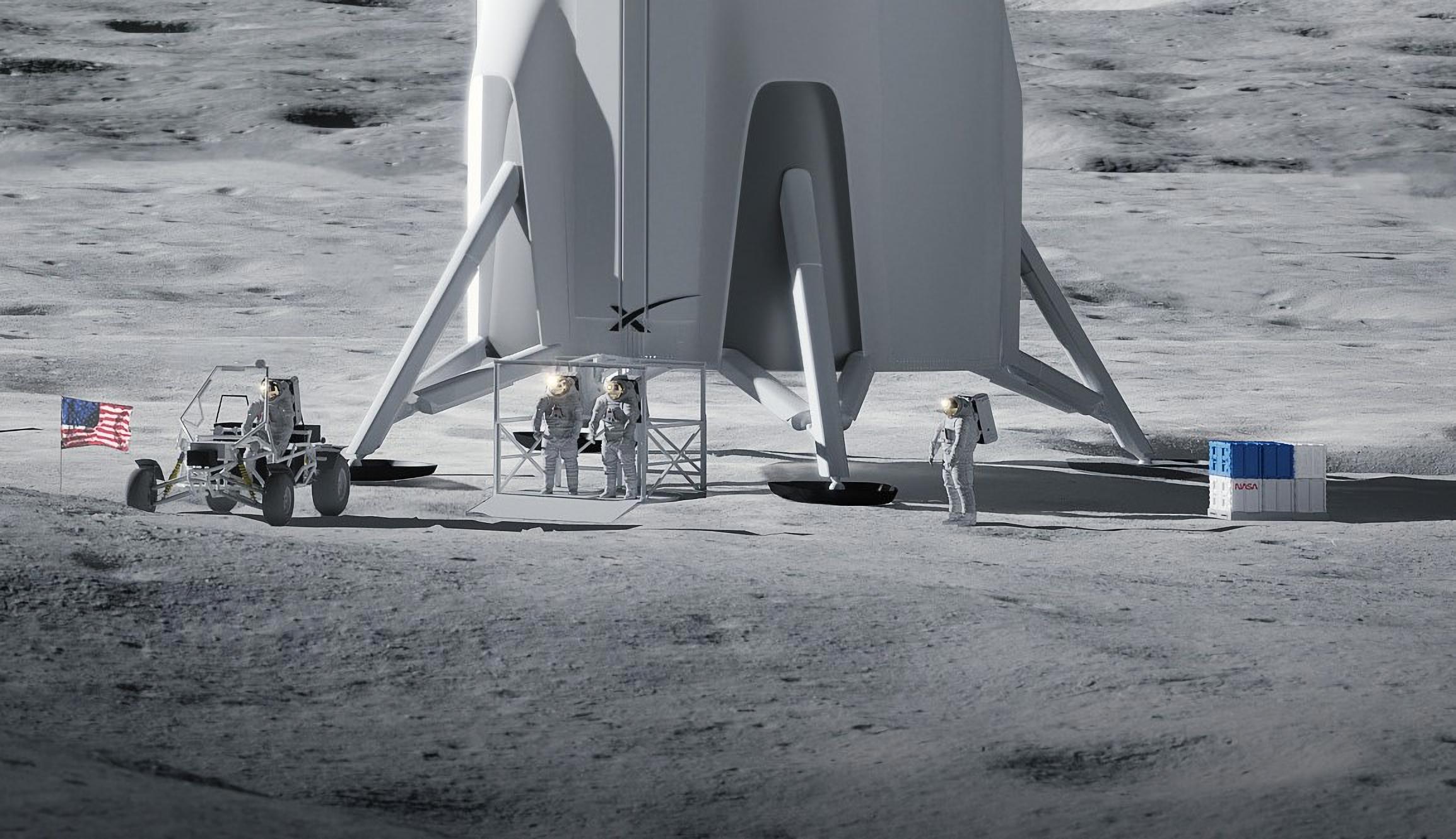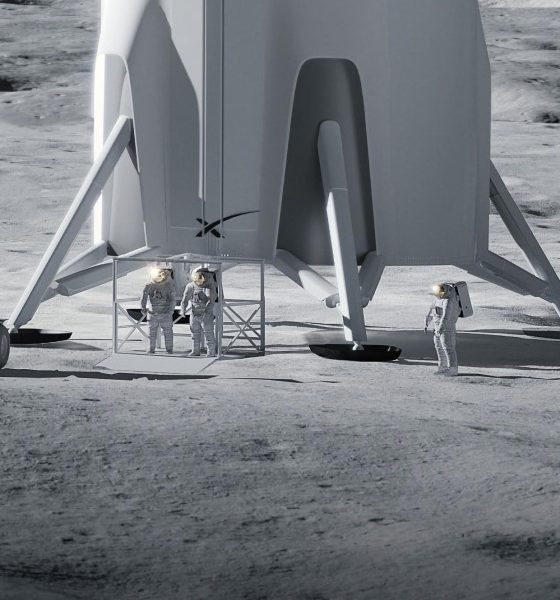

News
Elon Musk says SpaceX could build new Moon spacesuits for NASA
A new report from NASA’s Office of the Inspector General (OIG) strongly suggests that spacesuit availability, of all things, could prevent NASA from returning humans to the Moon on schedule in 2024.
Days prior, a similar watchdog office (GAO) denied protests from Blue Origin and Dynetics that were preventing NASA and SpaceX from working on the Starship-derived lander that will land those same humans on the Moon. Now, in an indirect response to NASA OIG’s analysis of the status of NASA’s next-generation spacesuit procurement efforts, CEO Elon Musk says that SpaceX may be able to provide its own custom Moon-rated spacesuits on top of a Starship lander.
As it turns out, SpaceX is already one of around two dozen “interested parties” [PDF] active in NASA’s new xEVAS (Exploration Extravehicular Activity Services) program – an effort to commandeer the spectacular success of commercial cargo and crew programs to replace half-century-old spacesuits. xEVAS has currently released a draft Request for Proposal (RFP) and is awaiting responses to that draft until mid-August before releasing the true RFP in mid-September.
Interested parties will then have until mid-October to submit proposals to design and build modern EVA (extravehicular activity) spacesuits capable of supporting astronauts on the lunar surface and on spacewalks in Earth orbit. NASA says it will then take a full five (or seven) months to review those proposals, downselect, and reward at least one or two contracts – hopefully resulting in two redundant EVA systems much like the 2+ redundant providers NASA chose to support its Commercial Crew (CCP) and Cargo Resupply Services (CRS) programs.
Over the last decade and a half, NASA has been very gradually working on its own next-generation EVA suits. Known as “xEMU,” the program has been less than smooth, running into multiple issues, funding shortfalls, and delays over the years. NASA OIG’s August 10th, 2021 report [PDF] says that the minimum two xEMU suits needed to support a planned crewed Moon landing as early as 2024 are almost certainly not going to be ready by 2024 after COVID-19, funding shortfalls, and technical difficulties recently delayed the program by almost two years. The office estimates that those NASA-built EVA suits will be ready absolutely no earlier than April 2025.
However, in April 2021, NASA kicked off its brand new xEVAS program – a program that strongly implies that the agency is all but giving up on building its own xEMU EVA suits. While it appears that the agency still plans to build six of its own xEMU suits as a hedge against its innovative, unprecedented xEVAS EVA-suits-as-a-service program, there’s a chance that NASA’s prospective commercial providers could help mitigate or outright prevent spacesuit availability from delaying humanity’s return to the Moon.
Of course, with NASA set to award xEVAS contracts no earlier than either March or May 2022, providers would be left with a mere ~30 months to design, prototype, build, and qualify what amount to personal human-rated spacecraft (EVA suits). According to NASA, “the goal is to achieve one or more EVA service demonstrations as early as 2024, and the full suite of commercial EVA services beginning as soon as feasible thereafter” – an extraordinarily ambitious target.
Notably, for its spectacularly successful Crew Dragon program, SpaceX has already developed and repeatedly flown a custom pressure suit for Dragon astronauts. That IVA suit is designed to keep astronauts alive in the event of spacecraft depressurization. Due to the mobility they must provide and a resultant need for light and portable power and life support systems, EVA suits are dramatically more complex than IVA suits, which offer very little mobility when fully pressurized and are permanently connected to their spacecraft through umbilicals.
If anyone can rise to the challenge of developing an EVA suit from scratch in two years, though, it’s likely SpaceX.

Cybertruck
Tesla drops latest hint that new Cybertruck trim is selling like hotcakes
According to Tesla’s Online Design Studio, the new All-Wheel-Drive Cybertruck will now be delivered in April 2027. Earlier orders are still slated for early this Summer, but orders from here on forward are now officially pushed into next year:

Tesla’s new Cybertruck offering has had its delivery date pushed back once again. This is now the second time, and deliveries for the newest orders are now pushed well into 2027.
According to Tesla’s Online Design Studio, the new All-Wheel-Drive Cybertruck will now be delivered in April 2027. Earlier orders are still slated for early this Summer, but orders from here on forward are now officially pushed into next year:
🚨 Tesla has updated the $59,990 Cybertruck Dual Motor AWD’s estimated delivery date to April 2027.
First deliveries are still slated for June, but if you order it now, you’ll be waiting over a year.
Demand appears to be off the charts for the new Cybertruck and consumers are… pic.twitter.com/raDCCeC0zP
— TESLARATI (@Teslarati) February 26, 2026
Just three days ago, the initial delivery date of June 2026 was pushed back to early Fall, and now, that date has officially moved to April 2027.
The fact that Tesla has had to push back deliveries once again proves one of two things: either Tesla has slow production plans for the new Cybertruck trim, or demand is off the charts.
Judging by how Tesla is already planning to raise the price based on demand in just a few days, it seems like the company knows it is giving a tremendous deal on this spec of Cybertruck, and units are moving quickly.
That points more toward demand and not necessarily to slower production plans, but it is not confirmed.
Tesla Cybertruck’s newest trim will undergo massive change in ten days, Musk says
Tesla is set to hike the price on March 1, so tomorrow will be the final day to grab the new Cybertruck trim for just $59,990.
It features:
- Dual Motor AWD w/ est. 325 mi of range
- Powered tonneau cover
- Bed outlets (2x 120V + 1x 240V) & Powershare capability
- Coil springs w/ adaptive damping
- Heated first-row seats w/ textile material that is easy to clean
- Steer-by-wire & Four Wheel Steering
- 6’ x 4’ composite bed
- Towing capacity of up to 7,500 lbs
- Powered frunk
Interestingly, the price offering is fairly close to what Tesla unveiled back in late 2019.
Elon Musk
Elon Musk outlines plan for first Starship tower catch attempt
Musk confirmed that Starship V3 Ship 1 (SN1) is headed for ground tests and expressed strong confidence in the updated vehicle design.

Elon Musk has clarified when SpaceX will first attempt to catch Starship’s upper stage with its launch tower. The CEO’s update provides the clearest teaser yet for the spacecraft’s recovery roadmap.
Musk shared the details in recent posts on X. In his initial post, Musk confirmed that Starship V3 Ship 1 (SN1) is headed for ground tests and expressed strong confidence in the updated vehicle design.
“Starship V3 SN1 headed for ground tests. I am highly confident that the V3 design will achieve full reusability,” Musk wrote.
In a follow-up post, Musk addressed when SpaceX would attempt to catch the upper stage using the launch tower’s robotic arms.
“Should note that SpaceX will only try to catch the ship with the tower after two perfect soft landings in the ocean. The risk of the ship breaking up over land needs to be very low,” Musk clarified.
His remarks suggest that SpaceX is deliberately reducing risk before attempting a tower catch of Starship’s upper stage. Such a milestone would mark a major step towards the full reuse of the Starship system.
SpaceX is currently targeting the first Starship V3 flight of 2026 this coming March. The spacecraft’s V3 iteration is widely viewed as a key milestone in SpaceX’s long-term strategy to make Starship fully reusable.
Starship V3 features a number of key upgrades over its previous iterations. The vehicle is equipped with SpaceX’s Raptor V3 engines, which are designed to deliver significantly higher thrust than earlier versions while reducing cost and weight.
The V3 design is also expected to be optimized for manufacturability, a critical step if SpaceX intends to scale the spacecraft’s production toward frequent launches for Starlink, lunar missions, and eventually Mars.
News
Tesla FSD (Supervised) could be approved in the Netherlands next month: Musk
Musk shared the update during a recent interview at Giga Berlin.

Tesla CEO Elon Musk shared that Full Self-Driving (FSD) could receive regulatory approval in the Netherlands as soon as March 20, potentially marking a major step forward for Tesla’s advanced driver-assistance rollout in Europe.
Musk shared the update during a recent interview at Giga Berlin, noting that the date was provided by local authorities.
“Tesla has the most advanced real-world AI, and hopefully, it will be approved soon in Europe. We’re told by the authorities that March 20th, it’ll be approved in the Netherlands,’ what I was told,” Musk stated.
“Hopefully, that date remains the same. But I think people in Europe are going to be pretty blown away by how good the Tesla car AI is in being able to drive.”
Tesla’s FSD system relies on vision-based neural networks trained on real-world driving data, allowing vehicles to navigate using cameras and AI rather than traditional sensor-heavy solutions.
The performance of FSD Supervised has so far been impressive. As per Tesla’s safety report, Full Self-Driving Supervised has already traveled 8.3 billion miles. So far, vehicles operating with FSD Supervised engaged recorded one major collision every 5,300,676 miles.
In comparison, Teslas driven manually with Active Safety systems recorded one major collision every 2,175,763 miles, while Teslas driven manually without Active Safety recorded one major collision every 855,132 miles. The U.S. average during the same period was one major collision every 660,164 miles.
If approval is granted on March 20, the Netherlands could become the first European market to greenlight Tesla’s latest supervised FSD (Supervised) software under updated regulatory frameworks. Tesla has been working to secure expanded FSD access across Europe, where regulatory standards differ significantly from those in the United States. Approval in the Netherlands would likely serve as a foundation for broader EU adoption, though additional country-level clearances may still be required.








